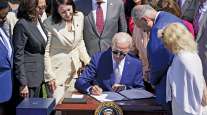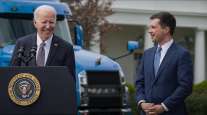Infrastructure Spending Plans Trapped by Partisan Wrangling
This story appears in the Aug. 5 print edition of Transport Topics.
Transportation spending dominated much of the political crossfire in Washington last week between President Obama and House Republicans.
As the week ended, however, there appeared to be little, if any, progress toward a real solution: Republican leaders scoffed at an Obama funding proposal and were then unable to muster enough votes to pass their own transportation bill in the House. Meanwhile, Senate Republicans blocked progress on a Democrat-sponsored transportation bill in that chamber.
And then Congress went home for a five-week recess.
Speaking at an Amazon fulfillment facility in Tennessee, Obama on July 30 proposed lowering the tax rate on corporations from 35% to 28%, while using the money gained from closing their tax loopholes for infrastructure and other job-creating activities.
Obama said the speed of delivering goods depends in part “on do we have good roads; do we have good bridges; do we have state-of-the-art airports? The nation has about $2 trillion of deferred infrastructure maintenance.”
The speech in Chattanooga followed a similar one the previous week in Jacksonville, Fla.
The president did not specify all of the tax loopholes he wants to close, but White House aides said one would target the profits corporations keep overseas so they don’t have to pay U.S. taxes on them.
Bills have been introduced in the House and Senate to “repatriate” the money by offering incentives to corporations and dedicate the dollars to infrastructure.
Rep. Bill Shuster (R-Pa.) chairman of the House Transportation and Infrastructure Committee, was quick to pan Obama’s proposal.
Shuster said in a statement that the president was “continuously recycling old ideas … [while offering] little substance in moving forward to address our nation’s infrastructure needs.”
Meanwhile in the House, Speaker John Boehner (R-Ohio) had to park his fiscal 2014 transportation appropriations bill because he didn’t have enough votes to pass it and send it to the Senate.
The lack of support was seen by some observers as a sign that a number of Republican legislators were losing their taste for across-the-board budget cuts. The bill called for $4.4 billion in trims from 2013 funding levels for transportation and housing programs.
The fight over this bill led Appropriations Committee Chairman Harold Rogers (R-Ky.) to lash out. In a note to colleagues, he said, “Sequestration — and its unrealistic and ill-conceived discretionary cuts — must be brought to an end.”
He said Congress and the White House must quickly agree to a budget compromise “that repeals sequestration, takes the nation off this lurching path from fiscal crisis to fiscal crisis, reduces our deficits and debt, and . . . fund[s] the government in a responsible — and attainable — way.”
Democrats also failed to muster enough support later to pass their transportation appropriations bill in the Senate.
After both measures failed, the chambers recessed — for five weeks.
When they return, legislators face a new fiscal year beginning Oct. 1, a Highway Trust Fund expected to go broke in 2015 and no long-term funding plan to fix deteriorating roads and bridges.
While the fight over the appropriate role for the government to play in transportation funding “would be a fascinating debate to witness on a college campus, the fact it is taking place in Congress means that very real needs — like clean water and efficient transportation networks — are for the moment being sacrificed in the name of ideological purity,” said Brian Turmail, spokesman for the Associated General Contractors, which opposes the billions of dollars in spending cuts in the House bill.
The failure of the appropriations bills to even come to a vote means Congress is “back to paralysis,” said Greg Cohen, president of the American Highway Users Alliance. “It’s embarrassing.”
“The implosion of the transportation appropriations bills has everything to do with the overall budget process,” said Mary Phillips, American Trucking Associations’ senior vice president of legislative affairs.
“The funding levels for all appropriations bills are based on the budgets passed by the Senate and House; their respective budgets are very different and, as a result, the entire appropriations process is going nowhere, and we are looking at a fight in September” over a continuing resolution, Phillips added.
Transportation, she said, is just one casualty of the ongoing division over budget issues.
Darrin Roth, who monitors highway funding for ATA, said that despite cuts in the House bill to public transit, both the House and Senate bills maintain the $40.2 billion annual spending level for highways authorized last year in MAP-21.
Emil Frankel, visiting scholar at the Bipartisan Policy Center, a Washington think tank, said transportation funding issues are hostage to a larger ideological split.
“The days of very substantial funding for transportation, certainly for the immediate future, are over,” said Frankel, who was an assistant secretary for transportation under President George W. Bush.
ATA’s Phillips said the president’s corporate tax plan does nothing to provide long-term funding for the Highway Trust Fund.




